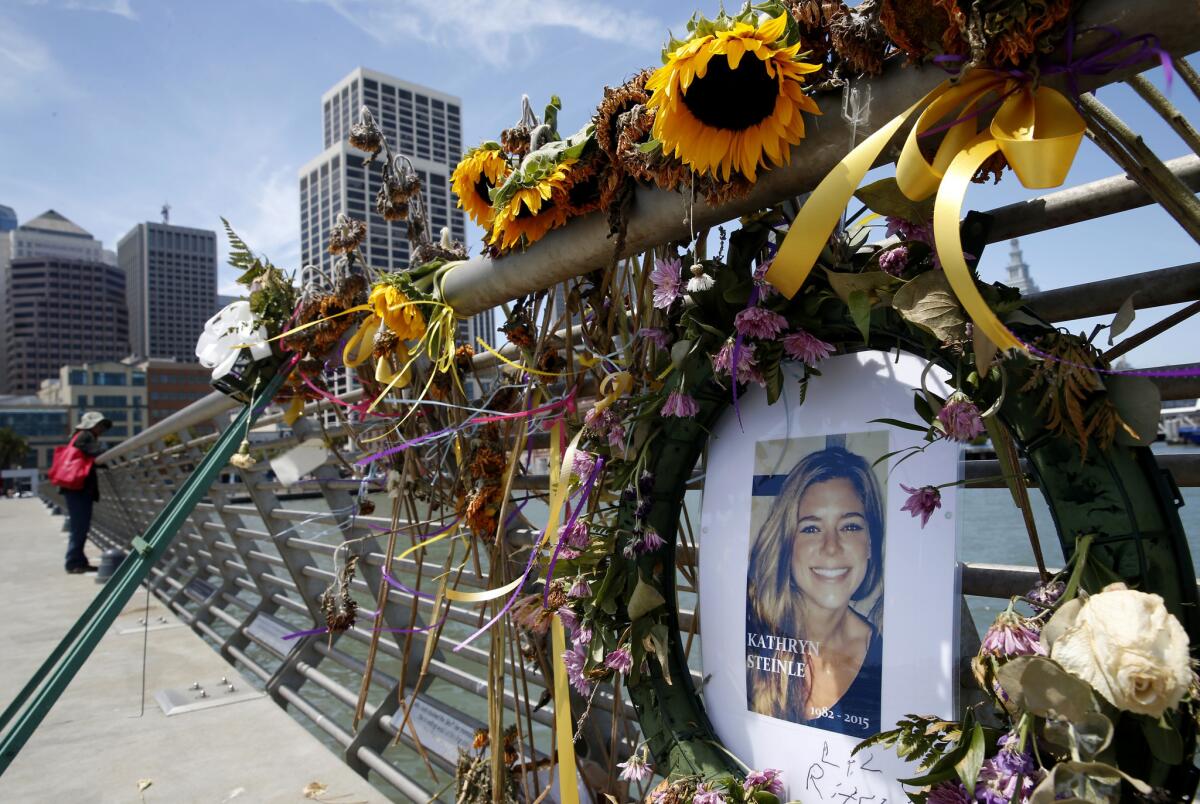Suit blaming U.S. government in Kate Steinle’s shooting death is tossed

- Share via
A federal judge on Monday dismissed a lawsuit against the U.S. government filed by the family of a woman fatally shot on a San Francisco pier in 2015 whose death became a flash point in the national debate over immigration policy.
The lawsuit filed by Kate Steinle’s parents alleged negligence on the part of the government because one of their employees, a federal park ranger, left the handgun that was later used to shoot their daughter unsecured in an SUV parked near the waterfront in San Francisco.
According to court filings, ranger John Woychowski had placed the gun inside a backpack in his locked SUV while he and his family went into a restaurant for dinner on a break from a drive from Southern California to Sacramento on June 27, 2015. When they returned to the car less than two hours later, two windows had been smashed and some of the family’s luggage — including the backpack with the handgun — had been stolen.
Four days later, attorneys for Jose Garcia Zarate contend he mistakenly picked up the gun, which was wrapped in a T-shirt, and it went off. The bullet ricocheted off the ground and struck Steinle in the back, mortally wounding her as she was walking along Pier 14 with her father.
Chief Magistrate Judge Joseph Spero wrote in his decision that while Woychowski and his employer, the U.S. Bureau of Land Management, may have been negligent for leaving the loaded handgun in the parked car in an unfamiliar city at night, too much time had passed and too many events had occurred by the time Steinle was killed for the court to show a direct connection between the theft and the shooting.
“In this case, the gun traveled at least some distance from the theft, three and a half days elapsed, the gun changed hands once at the very least, and there is no way to know what else transpired during that time,” Spero wrote.
Spero also wrote there was no evidence that Garcia Zarate stole the gun.
“Even if the gun was taken directly to Pier 14 by the thief and left there until [he] found it days later — facts that, again, cannot be determined on the record presented — that separation in time, space, actors, and conduct would be sufficient in this Court’s view to break the chain of proximate causation between Woychowski’s purportedly negligent storage of the gun and Steinle’s death,” he wrote.
Alison Cordova, a lawyer representing Steinle’s parents, said they plan to appeal the ruling. She could not immediately be reached for further comment Tuesday.
Steinle’s slaying stoked debate over illegal immigration in the U.S. and the role of local police in enforcing federal immigration laws. President Trump cited Steinle’s death during his campaign to make his case for building a wall across the U.S.-Mexico border.
“This senseless and totally preventable act of violence committed by an illegal immigrant is yet another example of why we must secure our border immediately,” Trump, a presidential candidate at the time, said in a statement two days after Steinle died. “This is an absolutely disgraceful situation, and I am the only one that can fix it.”
Garcia Zarate, who was living in the United States illegally, had been deported five times and had just completed his third federal prison term for felony reentry into the U.S. from Mexico in March 2015 when federal officials turned him over to San Francisco to face a 20-year-old bench warrant for marijuana possession and sales. However, prosecutors declined to pursue the case, and he was released.
The shooting occurred four months later. During his trial, Garcia Zarate’s attorney argued that the weapon went off in their client’s hands in what was a tragic accident.
A San Francisco jury acquitted Garcia Zarate of murder and assault charges, convicting him only of being a felon in possession of a gun. A state appeals court overturned that conviction. The 46-year-old remains in custody and faces federal charges of being a felon and an undocumented immigrant in possession of a gun.
Steinle’s parents had also sued San Francisco for damages, but Spero dismissed those claims in 2017, saying there was no prior evidence that Garcia Zarate was dangerous and federal law did not require the city to inform the government before he was released under San Francisco’s sanctuary city policy.
The Associated Press contributed to this report.
More to Read
Sign up for Essential California
The most important California stories and recommendations in your inbox every morning.
You may occasionally receive promotional content from the Los Angeles Times.











